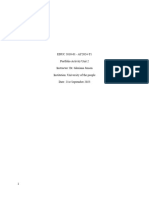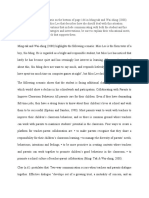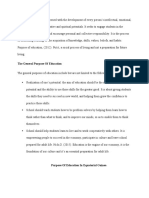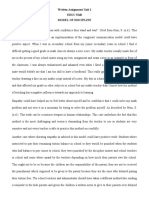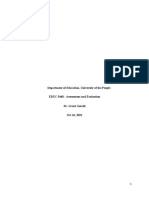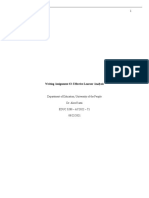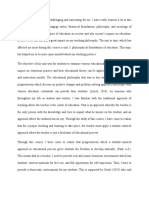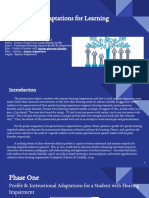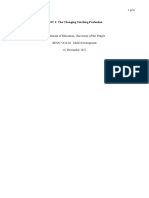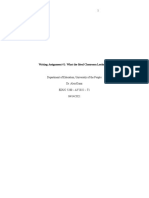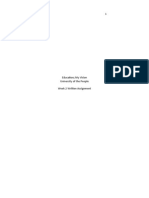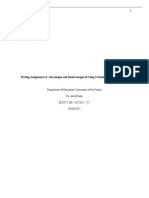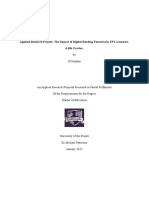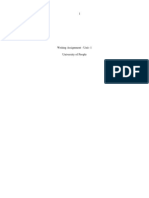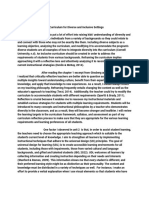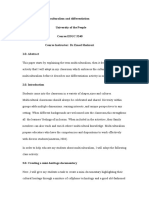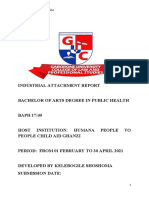EDUC5220 Discussion Unit 5 - 3
EDUC5220 Discussion Unit 5 - 3
Uploaded by
Peter GunawanCopyright:
Available Formats
EDUC5220 Discussion Unit 5 - 3
EDUC5220 Discussion Unit 5 - 3
Uploaded by
Peter GunawanOriginal Description:
Copyright
Available Formats
Share this document
Did you find this document useful?
Is this content inappropriate?
Copyright:
Available Formats
EDUC5220 Discussion Unit 5 - 3
EDUC5220 Discussion Unit 5 - 3
Uploaded by
Peter GunawanCopyright:
Available Formats
As Bruner discussed his ideas of units of study, there were many things that came to mind.
One of
the things that stood out the most, was the resemblance his suggestions have with the curriculum
we use in the Early Childhood program I currently work at. These are provided by an american
company and each study or unit comes as a kit that has a teaching guide with detailed information
and steps to follow daily or weekly. Each study usually lasts six weeks and they cover themes that
are related to children’s everyday life experiences (clothes, trees, buildings, etc.). It also suggests
the materials to have at hand for the children either to work or play, books to read and questions to
ask at the beginning of each study or as a way to extend it if needed. Having resources like this one,
were very handy at the start of my teaching career seven years ago, since I did not have a
background in education or prior experience as the lead teacher or a class. They are also practical,
research based and offer constant revisions, so it allows us to stay updated.
Bruner (1965) stated that “the materials, in short, have got to be made usable and attractive not only
to the highly gifted teacher, but to teachers in general, and to teachers who live with the ordinary
fatigue of coping with younger pupils day by day. They cannot be overburdened with reading, nor
can the reading be of such an order as to leave them with a feeling of impotence. At the same time,
the material presented should be loosely enough woven to permit the teacher to satisfy his interests
in forming a final product to be presented to children” (p 23).
I think his empathy towards educators was very honest and sums up an aspect of our job. Besides
the continuous reinvention and our efforts to be there for our students, the reality is that it is quite
draining to have so much of our energy invested in our jobs and the reason why most current social
emotional learning programs focus on prioritizing a teacher’s well being before anything else.
His final words on gathering “educators’ wisdom” to make available for future teachers, also spoke to
me about collaboration; a concept that contemporary curriculums like IB propose as a skill we need
to succeed in the 21st century. This is an element that should be prevalent in our classrooms as it
will support students strive in and out of school environments. In my context, we mainly focus on the
development of social emotional skills that help kids foster positive interactions and relationships
with peers. Teaching young children to be assertive or to share supplies are examples that can be
seen in a preschool classroom every day.
Change is a significant part of working in this field. There are elements proposed by Bruner that
have changed overtime. Devices are indeed some of the ones that will continue to vary, especially
now that both teachers and students are working remotely and exclusively with technology. Another
element that is visibly different in my milieu is the way students’ queries guide our learning. There
are many approaches to nourish a child’s curiosity, like project based learning and inquiry models.
Like Alper (2018) wrote in an article for Edutopia, “recent education reforms call for a shift in
pedagogy to provide students with the skills necessary to be competitive in a global society. One
such shift, inquiry-based instruction, is supported by evidence as a successful approach to fulfill the
goals and processes of the Next Generation Science Standards (NGSS)”.
If students are “in charge of their learning”, could this mean all guides and written material that is
ready for teachers to implement might become obsolete in the future? Who knows..
Reflecting on the way we are currently teaching versus how it was done a couple of months ago is
definitely thought-provoking and interesting to keep exploring. The good thing is that our profession
has prepared us well to embrace and adapt to change.
References:
Alper, C. (2018, August 17). Embracing Inquiry-Based Instruction. Retrieved from
https://www.edutopia.org/article/embracing-inquiry-based-instruction
Bruner, J. (1965). Man a Course of Study. Man: A Course of Study. Occasional Paper No. 3.
Retrieved from https://files.eric.ed.gov/fulltext/ED178390.pdf
You might also like
- 21 Qualities of A LeaderDocument10 pages21 Qualities of A LeaderacerkingNo ratings yet
- Educ 5410 Written Assignment Unit 1Document8 pagesEduc 5410 Written Assignment Unit 1Tejumade Musah100% (1)
- EDUC5711 Week 8 Discussion Assignment Unit 8Document3 pagesEDUC5711 Week 8 Discussion Assignment Unit 8Meleisa WrayNo ratings yet
- Of The S They e and Together. When Parents Participate in These Meetings, TheyDocument2 pagesOf The S They e and Together. When Parents Participate in These Meetings, TheyZonia Nill100% (1)
- Centrifugal Clutch DFMADocument2 pagesCentrifugal Clutch DFMAAshweein Narayanan100% (1)
- Independent Thinking on Teaching and Learning: Developing independence and resilience in all teachers and learners (Independent Thinking On... series)From EverandIndependent Thinking on Teaching and Learning: Developing independence and resilience in all teachers and learners (Independent Thinking On... series)No ratings yet
- Unit 6 Reflective Portfolio - EDUC 5810Document3 pagesUnit 6 Reflective Portfolio - EDUC 5810tobi.igbayiloyeNo ratings yet
- EDUC 5810 Portfolio Unit 2Document4 pagesEDUC 5810 Portfolio Unit 2Nhi Le0% (1)
- Armine Babayan EDUC 5810 Unit 4 Portfolio AssignmentDocument1 pageArmine Babayan EDUC 5810 Unit 4 Portfolio Assignmentpeaceambassadors47No ratings yet
- Portfolio - EDUC 5711-Unit 2 - Organizing Instruction of Diverse StudentsDocument5 pagesPortfolio - EDUC 5711-Unit 2 - Organizing Instruction of Diverse StudentsSquishy SooNo ratings yet
- EDUC5210 Week 8 Discussion Question Unit 8Document3 pagesEDUC5210 Week 8 Discussion Question Unit 8Meleisa WrayNo ratings yet
- EDUC5272 Week 3 Written Assignment Unit 3Document8 pagesEDUC5272 Week 3 Written Assignment Unit 3Leisa GordonNo ratings yet
- Assignment 7Document5 pagesAssignment 7PAUL LYNCHNo ratings yet
- EDUC 5420 UNIT 5 Discussion Assignment Identity DevelopmentDocument3 pagesEDUC 5420 UNIT 5 Discussion Assignment Identity DevelopmentJakuma MikeNo ratings yet
- Academia - Edu: Have A Multicultural Classroom Celebration. Diversity Ought To Be Celebrated, So Why Not MakeDocument4 pagesAcademia - Edu: Have A Multicultural Classroom Celebration. Diversity Ought To Be Celebrated, So Why Not MakePAUL LYNCHNo ratings yet
- Educ 5010 Discussion Assgn Unit 1Document3 pagesEduc 5010 Discussion Assgn Unit 1Chris EmekaNo ratings yet
- EDUC5010 Week 6 Discussion Question Unit 6Document4 pagesEDUC5010 Week 6 Discussion Question Unit 6Meleisa WrayNo ratings yet
- Educ 5010 Unit 5 Written AssignmentDocument4 pagesEduc 5010 Unit 5 Written AssignmentChifundoh Banda100% (1)
- EDUC 5270 Unit5 DF PDFDocument2 pagesEDUC 5270 Unit5 DF PDFSneha MishraNo ratings yet
- 5240 Portfolio Activity Unit 8Document9 pages5240 Portfolio Activity Unit 8KUNWAR JEE SINHANo ratings yet
- 5810 Unit 7 Written AssignmentDocument5 pages5810 Unit 7 Written AssignmentLifeless SoulzNo ratings yet
- Educ 5010 Written Assigmt Unit 3Document4 pagesEduc 5010 Written Assigmt Unit 3Chris Emeka100% (1)
- Unit 7 Reflective Portfolio - EDUC 5810Document3 pagesUnit 7 Reflective Portfolio - EDUC 5810tobi.igbayiloyeNo ratings yet
- Assignment 4Document6 pagesAssignment 4amal alostazNo ratings yet
- EDUC 5240 Written Assignment Unit 2Document4 pagesEDUC 5240 Written Assignment Unit 2Khadijat SmileNo ratings yet
- EDUC5440 Group Presentation 0001BDocument29 pagesEDUC5440 Group Presentation 0001Bangeli abueg100% (1)
- EDUC 5210 Written Assignment 3Document6 pagesEDUC 5210 Written Assignment 3Amy PattonNo ratings yet
- EDUC5440 Week 7 Written Assignment Unit 7Document6 pagesEDUC5440 Week 7 Written Assignment Unit 7Meleisa GordonNo ratings yet
- Unit 4 - Written AssignmentDocument5 pagesUnit 4 - Written Assignmentmonica kocharNo ratings yet
- Writing Assignment #3: Effective Learner AnalysisDocument8 pagesWriting Assignment #3: Effective Learner AnalysisMatthew BailinNo ratings yet
- EDUC 5410 Unit 1 Discussion February 2022Document4 pagesEDUC 5410 Unit 1 Discussion February 2022us n100% (1)
- Unit 1 EDCU 5210 Discussion ForumDocument3 pagesUnit 1 EDCU 5210 Discussion ForumRenon AngeloNo ratings yet
- EDUC 5910 Informed Consent FormDocument4 pagesEDUC 5910 Informed Consent FormBob BaldricNo ratings yet
- 5010 Unit 8 PortfolioDocument3 pages5010 Unit 8 PortfolioBright Appiagyei-BoakyeNo ratings yet
- Educ 5440 Discussion Assignment 7Document2 pagesEduc 5440 Discussion Assignment 7Olaniyi IsaacNo ratings yet
- Educ 5010 Written Assigmt Unit 2Document6 pagesEduc 5010 Written Assigmt Unit 2Chris Emeka100% (1)
- Group 3B - EDUC 5710 - Understanding Barriers To LearningDocument28 pagesGroup 3B - EDUC 5710 - Understanding Barriers To Learningangeli abuegNo ratings yet
- EDUC 5711 UNIT 5 Portfolio Activity CREATING LESSON PLANS FOR DIVERSE AND INCLUSIVE SETTINGSDocument3 pagesEDUC 5711 UNIT 5 Portfolio Activity CREATING LESSON PLANS FOR DIVERSE AND INCLUSIVE SETTINGSJakuma MikeNo ratings yet
- EDUC5010 Week 4 Portfolio Activity Unit 4Document3 pagesEDUC5010 Week 4 Portfolio Activity Unit 4Leisa GordonNo ratings yet
- EDUC5272 Week 1 Written Assignment Unit 1Document8 pagesEDUC5272 Week 1 Written Assignment Unit 1Leisa GordonNo ratings yet
- Educ 5240 Group Project - PPTX - 2Document34 pagesEduc 5240 Group Project - PPTX - 2Ferdaws Saleh100% (1)
- Educ5910 LaurencelimDocument123 pagesEduc5910 Laurencelimapi-689550524No ratings yet
- Teaching Students With Impairments-My Emotional ReactionsDocument6 pagesTeaching Students With Impairments-My Emotional ReactionsElijah0% (1)
- EDUC 5240 Unit 6 Written Assignment.Document4 pagesEDUC 5240 Unit 6 Written Assignment.Chifundoh BandaNo ratings yet
- Portfolio Activity Unit 7Document6 pagesPortfolio Activity Unit 7Diana DengNo ratings yet
- WK 8 Portfolio Activity Unit 8EDUC 5220Document7 pagesWK 8 Portfolio Activity Unit 8EDUC 5220Hussam AlotaiolyNo ratings yet
- Unit 1 (EDUC 5410) WADocument6 pagesUnit 1 (EDUC 5410) WAFRANCISCO ANTONIO DE LEON100% (1)
- Writing Assignment #1: What The Ideal Classroom Looks LikeDocument8 pagesWriting Assignment #1: What The Ideal Classroom Looks LikeMatthew BailinNo ratings yet
- Globally Personally 1Document5 pagesGlobally Personally 1Lifeless SoulzNo ratings yet
- Writing Assignment #4: Advantages and Disadvantages of Using Technology in The ClassroomDocument7 pagesWriting Assignment #4: Advantages and Disadvantages of Using Technology in The ClassroomMatthew Bailin100% (1)
- EDUC5271 Week 5 Written Assignment Unit 5Document5 pagesEDUC5271 Week 5 Written Assignment Unit 5Meleisa GordonNo ratings yet
- Educ 5410 Unit 3 Portfolio ActivityDocument4 pagesEduc 5410 Unit 3 Portfolio ActivityNzangura IreenNo ratings yet
- EDUC 5240 Written Assignment Unit 4Document4 pagesEDUC 5240 Written Assignment Unit 4Khadijat SmileNo ratings yet
- 5470 Unit 4 Written AssignmentDocument8 pages5470 Unit 4 Written AssignmentBob BaldricNo ratings yet
- EDUC5271 Week 6 Written Assignment Unit 6Document6 pagesEDUC5271 Week 6 Written Assignment Unit 6Leisa GordonNo ratings yet
- EDUC 5220 Unit - 1 Writing Assignment APADocument5 pagesEDUC 5220 Unit - 1 Writing Assignment APAGreshma Momaya100% (1)
- Unit 2 Written AssignmentDocument5 pagesUnit 2 Written AssignmentTejumade MusahNo ratings yet
- Portfolio-EDUC 5711-Unit 3 - Curriculum For Diverse and Inclusive SettingsDocument3 pagesPortfolio-EDUC 5711-Unit 3 - Curriculum For Diverse and Inclusive SettingsSquishy SooNo ratings yet
- Unit 8. Discussion Forum For EDUC 5240Document4 pagesUnit 8. Discussion Forum For EDUC 5240Kiptoo KiruiNo ratings yet
- EDUC 5010 Written AssignmentDocument5 pagesEDUC 5010 Written AssignmentTejumade MusahNo ratings yet
- EDUC 5240 Unit 2 Written AssignmentDocument6 pagesEDUC 5240 Unit 2 Written AssignmentSabrina Coppin-Kellman100% (1)
- EDUC5271 Week 1 Written Assignment Unit 1Document5 pagesEDUC5271 Week 1 Written Assignment Unit 1Meleisa Gordon100% (1)
- Fundamental Rights and Directive Principles of State Policy: Project ONDocument11 pagesFundamental Rights and Directive Principles of State Policy: Project ONTaruna Shandilya100% (1)
- Greta Mae Evans: Freelance ArtistDocument1 pageGreta Mae Evans: Freelance Artistelisa fernandezNo ratings yet
- Itzhak Bambagi Appointed As New CEO of KramerDocument2 pagesItzhak Bambagi Appointed As New CEO of KramerMeghna PorwalNo ratings yet
- Ultrasonic Sensor: Low-Cost Arduino-Based Ultrasonic Radar SystemDocument1 pageUltrasonic Sensor: Low-Cost Arduino-Based Ultrasonic Radar SystemosamaNo ratings yet
- Go Go Jonah BrochureDocument3 pagesGo Go Jonah BrochureTracy Schumann100% (2)
- IoT WSN Module 5 2018 by Prof SV 1 PDFDocument43 pagesIoT WSN Module 5 2018 by Prof SV 1 PDFmanju0071No ratings yet
- Leadership and AmbitionDocument21 pagesLeadership and Ambitionkookie bunnyNo ratings yet
- Leadership and Innovation Towards Firms' Performance: The Case of Selected Industries in OmanDocument9 pagesLeadership and Innovation Towards Firms' Performance: The Case of Selected Industries in Omancalich88No ratings yet
- Rio Tinto Everyday Respect ReportDocument85 pagesRio Tinto Everyday Respect ReportComunicarSe-ArchivoNo ratings yet
- Abayon V HRETDocument2 pagesAbayon V HRETneil peirceNo ratings yet
- 2019 Specification Book: Cabin Class - Single-Engine - Pressurized TurbopropDocument5 pages2019 Specification Book: Cabin Class - Single-Engine - Pressurized Turbopropsandy100% (1)
- Lean Construction: From Theory To Implementation: O. Salem, M.ASCE J. Solomon A. Genaidy and I. Minkarah, M.ASCEDocument8 pagesLean Construction: From Theory To Implementation: O. Salem, M.ASCE J. Solomon A. Genaidy and I. Minkarah, M.ASCEpatogakNo ratings yet
- Thapar UniversityDocument147 pagesThapar Universitydrupsc0% (1)
- Nomination - Business Skills Class: Nomination For Business Innovation and Investment (Permanent) VisaDocument6 pagesNomination - Business Skills Class: Nomination For Business Innovation and Investment (Permanent) VisaKeshav kumarNo ratings yet
- Dua Fatima (BBA171037) Consumber Behavior Assignment 3Document2 pagesDua Fatima (BBA171037) Consumber Behavior Assignment 3rameez mukhtarNo ratings yet
- New-Approved 2018-2019 School CalendarDocument1 pageNew-Approved 2018-2019 School Calendarapi-415699383No ratings yet
- Comfortable War Gaming: Reflections From An Old Timer': (Part The First) by Stuart AsquithDocument9 pagesComfortable War Gaming: Reflections From An Old Timer': (Part The First) by Stuart AsquithMauricio Miranda AlbarranNo ratings yet
- Writing An Introduction The Introduction Answers The QuestionsDocument5 pagesWriting An Introduction The Introduction Answers The QuestionsJOsh Lopez100% (1)
- Winning The GameDocument3 pagesWinning The GameRandallNo ratings yet
- The Indian Urban Land Ceiling Act : A Critique of The 1976 LegislationDocument13 pagesThe Indian Urban Land Ceiling Act : A Critique of The 1976 LegislationAayushi Godse100% (1)
- How Basketball Was Able To Storm The WorldDocument3 pagesHow Basketball Was Able To Storm The Worldkate asiaticoNo ratings yet
- The Rohingya Refugee Crisis Legal Protection On inDocument7 pagesThe Rohingya Refugee Crisis Legal Protection On inRam DevNo ratings yet
- Encube Corporate PresentationDocument19 pagesEncube Corporate PresentationAnnu KambleNo ratings yet
- The Rights of Inmates To Conjugal RightsDocument9 pagesThe Rights of Inmates To Conjugal RightsRo CheNo ratings yet
- Industrial Attachment ReportDocument34 pagesIndustrial Attachment ReportOtsile Charisma Otsile Saq100% (1)
- Write An Essay of About 350 Words To Present Your Opinion On This Issue. Give Reasons and Specific Examples To Support Your PositionDocument2 pagesWrite An Essay of About 350 Words To Present Your Opinion On This Issue. Give Reasons and Specific Examples To Support Your PositionCẩm TúNo ratings yet
- Evolved Sustainable Building Engineering in Vernacular Architecture of KurdistanDocument11 pagesEvolved Sustainable Building Engineering in Vernacular Architecture of Kurdistanarazoo mustafa azizNo ratings yet
- StatisticsDocument142 pagesStatisticsDr.B.THAYUMANAVARNo ratings yet







